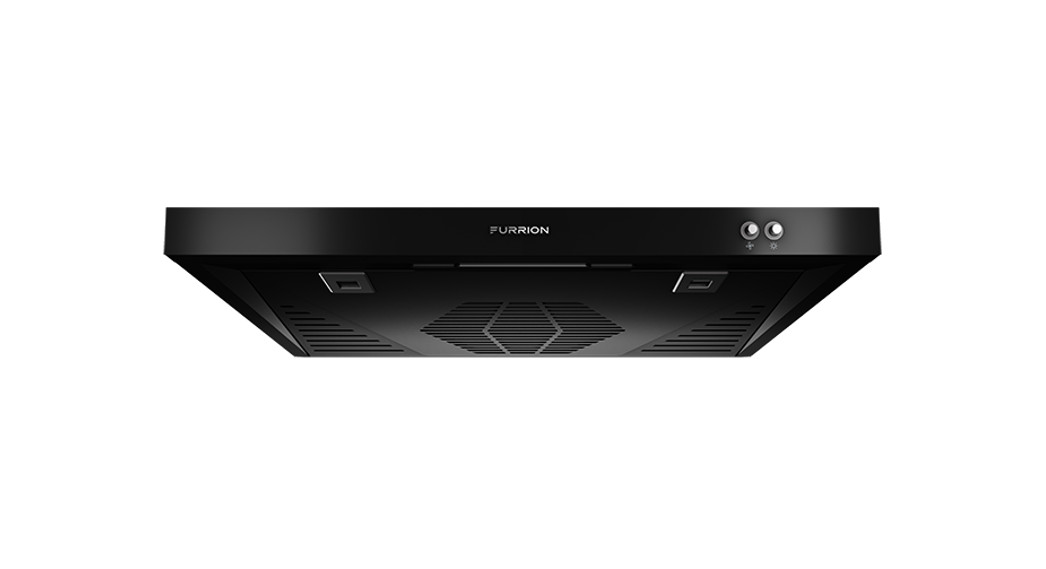

12V Horizontal RV Range HoodInstruction ManualFHO23SACR-BL / FHO23SACR-SSFHO23SACR-BP / FHO23SACR-SB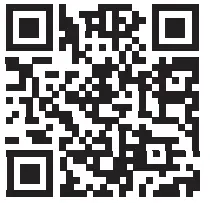 https://furrion.com/collections/cooking
https://furrion.com/collections/cooking
- To view the multi-language user manual, please access the link or scan the QR code.
Thank you for purchasing this Furrion® 12V Horizontal RV Range Hood. Before placing your new appliance into operation, please read these operating instructions carefully. They contain important information for safe use, installation, and maintenance of the appliance.Please keep this instruction manual in a safe place for future reference. Pass it onto possible new owners of the appliance.The manufacturer does not accept responsibility for any damages that may arise due to the non-observation of these instructions.
Important Safety Instructions
Warning and important safety instructions appearing in this guide are not meant to cover all possible conditions and situations that may occur. Common sense, caution, and care must be exercised when installing, maintaining, or operating the appliance.Always contact the manufacturer about problems or conditions you do not understand.
 CAUTIONSafety instruction: Failure to observe this instruction can cause fatal or serious injury.
CAUTIONSafety instruction: Failure to observe this instruction can cause fatal or serious injury.
- For general ventilating use only. Do not use to exhaust hazardous or explosive materials or vapors.
- Do not allow insulation, ceiling finishing materials, roofing materials, or other debris to enter the fan housing or ductwork.Motor failures due to debris are not subject to warranty coverage.
RANGE HOOD SAFETY
Your safety and the safety of others are very important.We have provided many important safety messages in this manual and your appliance. Always read and obey all safety messages.![]()
![]()
![]()
![]()
![]()
![]()
- Do not use this fan with any solid-state speed control device.
- Installation work and electrical wiring must be done by a qualified person(s) in accordance with all applicable codes and standards, including fire-related construction.
- Sufficient air is needed for proper combustion and exhausting of gases through the flue (chimney) of fuel-burning equipment to prevent back drafting. Follow the heating equipment manufacturer’s guidelines and safety standards such as those published by the National Fire Protection Association (NFPA), The American Society for Heating, Refrigeration and Air Conditioning Engineers (ASHRAE), and local code authorities.
- When cutting into walls or ceilings, do not damage electrical wiring and other hidden utilities.
- Use only metal ductwork. Exhaust air must be ducted to the outside. Do not vent exhaust air into spaces within walls, ceilings, attics, crawl spaces or garages.
- Inadequate repairs may cause serious hazards. For repair service, please contact the service center in your country.









- Use this unit only in the manner intended by the manufacturer.If you have questions, contact the manufacturer.
- Before servicing or cleaning the unit, switch power off at the service panel and lock service disconnecting means to prevent power from being switched on accidentally.When the service disconnecting means cannot be locked, securely fasten a prominent warning device, such as a tag, to the service panel.
- People (including children) whose physical, sensory, or mental capacities or whose lack of experience or knowledge prevent them from using this product safely should not use it without the supervision or instruction of a responsible person.









- SMOTHER FLAMES with a close-fitting lid, cookie sheet or metal tray, then turn off the burner.BE CAREFUL TO PREVENT BURNS.If the flames do not go out immediately, EVACUATE AND CALL THE FIRE DEPARTMENT.
- NEVER PICK UP A FLAMING PAN! You may be burned.
- DO NOT USE WATER, including wet dishcloths or towels –a violent steam explosion will result.
- Use an extinguisher only if:− You know you have a Class ABC extinguisher, and you already know how to operate it.− The fire is small and contained in the area where it started.− The fire department is being called.− You can fight the fire with your back to an exit.
Based on ‘Kitchen Fire Safety Tips’ published by the NFPA.









- Never leave surface units unattended at high settings. Boilovers cause smoking and greasy spillovers that may ignite.
- Heat oils slowly on low or medium settings.
- Always turn the hood on when cooking at high heat or when cooking or flambeing food.
- Clean ventilating fans frequently. Grease should not be allowed to accumulate on the fan or filter.
- Use proper pan size. Always use cookware appropriate for the size of the surface element.
Save these instructions for future reference!
Installation
What’s in the Box
Make sure all the following items are included in the packaging. If any items are damaged or missing, contact your dealer.RV Range Hood:
- 12V RV Range Hood
- Mounting Screws (4 pieces)
- Instruction Manual
- Warranty Leaflet
Exterior Wall Vent (Sold Separately)
- Exterior Wall Vent
- Mounting Screws (6 pieces)
- Instruction Manual
- Warranty Leaflet
NOTE: If a Furrion exterior wall vent is purchased: please refer to the user manual IG-FHA00010 for the installation. The installation should conform to these installation instructions and with the standards for recreational vehicles, NFPA 1192.
![]()
![]()









Range Hood Installation
Disconnect power.









![]()
![]()
Electrical Requirements
Observe all governing codes and ordinaces.Ensure that the electrical installation is adequate and in conformance with National Electrical Code, ANSI/NFPA 70 (lastest edition), or CSA Standards C22.1-94, Canadian Elec trical Code, Part 1 and C22.2 No. 0-M91 (lastest edition) and local codes and ordinances.If codes permit and a separate ground wire is used, it is recommended that a qualified electrician determine that the ground path is adequate.Wire sizes and connections must confirm with the rating of the appliance as specified on the model/serial/rating plate. The model/serial/rating plate is located inside the range hood. Wire sizes must confirm to the requirements of the National Electrical Code, ANSI/NFPA 70 (lastest edition), or CSA Standards C22.1-94, Canadian Electrical Code, Part 1 and C22.2 No. 0-M91 (lastest edition) and local codes and ordinances.Recreational vehicle fan units.Do not operate any fan with a damaged cord or plug. Discard fan or return to an authorized service facility for examination and/or repair.
Product Dimensions
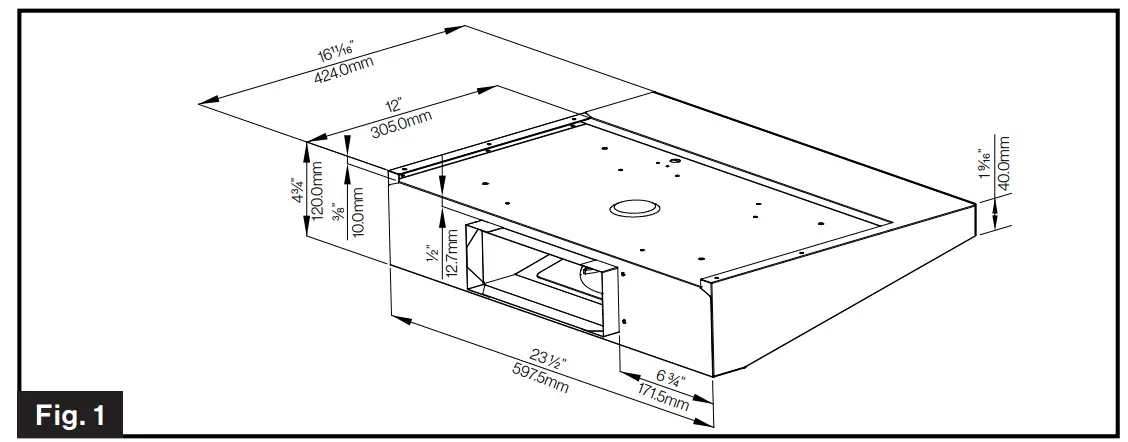

- Take out the range hood from box and put on a flat surface with the grill cover facing up.
- Press the two release tabs on the grill cover to release it from range hood. (Fig. 2)

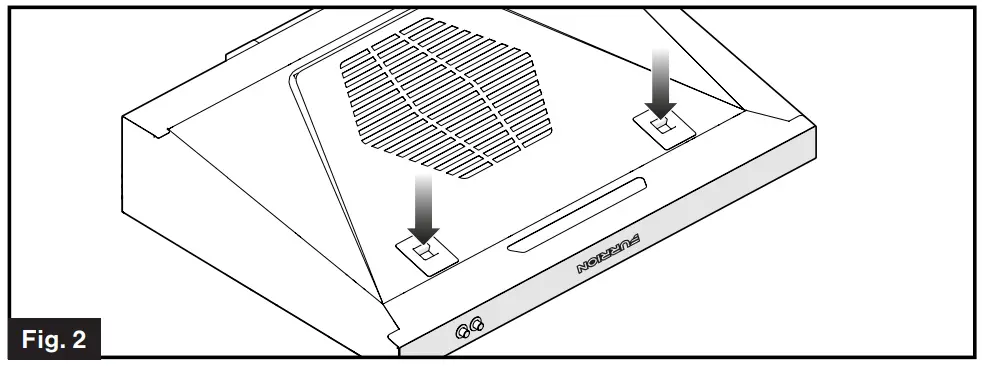
- Mark centerline of range hood on the wall. (Fig. 3)NOTE: The minimum vertical distance to combustible material above the range cooking top is 191/2 inches when installed with a range hood, provided the overhead construction does not extend 1611/16 inches from the rear wall. (Fig. 4) This range hood will work with cooktops and ranges with input rating up to 22,500 BTU.

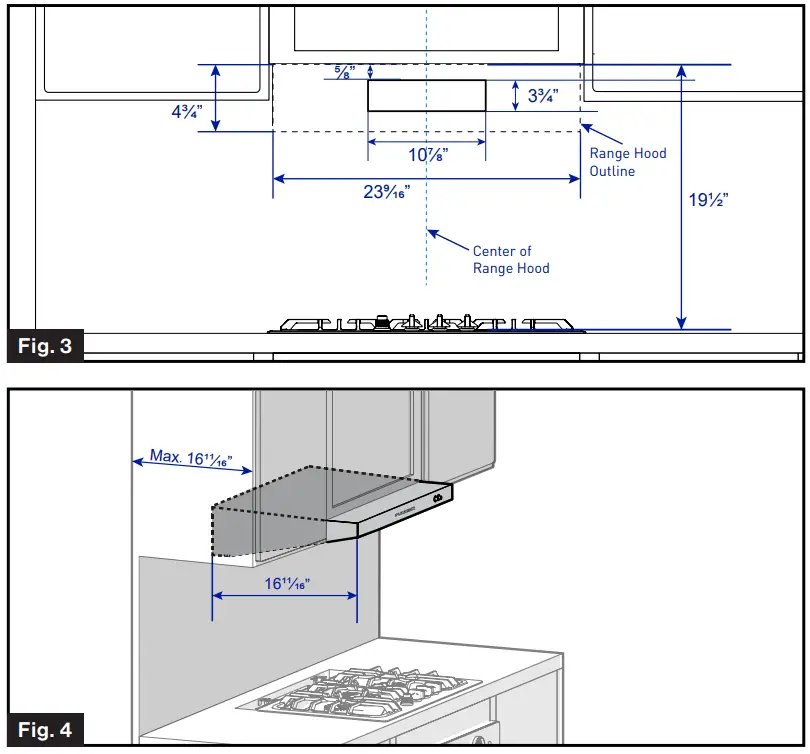
- Mark and cutout a through-hole on the wall according to the dimensions outlined in Fig. 3.
- Connect the vent hood white wire negative (-) to the incoming power supply negative (-) wire and the vent hood black wire positive (+) to the incoming power supply positive (+) wire. (Fig 5) NOTE: Make all electrical supply connections in accordance with local and/or applicable codes.

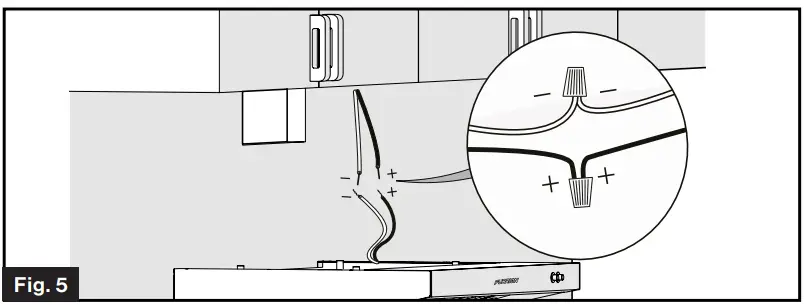
- Insert vent collar at back of the range hood into the cutout area and fix the range hood onto the top cabinet with the four screws provided. (Fig. 6 and Fig. 7)NOTE: DO NOT over tighten the screws.

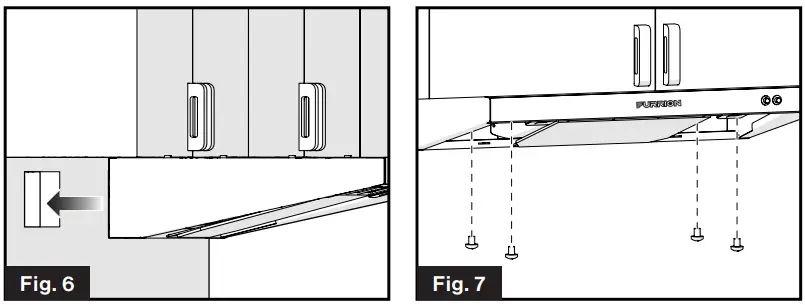
- Verify that the blower housing and ductwork are free of debris and fan blades spin freely.
- Replace the grill cover to the range hood and press the release tabs until you hear a click. (Fig. 8) The grill cover is securely attached to the range hood. (Fig. 9)


Operation
Fan ControlPress the fan button once to turn on the fan, press twice to turn off. (Fig. 10)

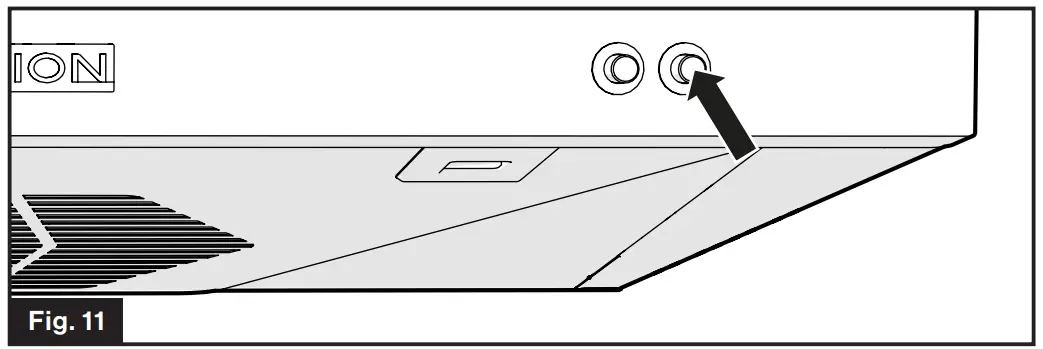

Cleaning and Maintenance









External CleaningWipe the range hood frequently with warm soapy water using a mild detergent.NOTE: Never use scouring pads or abrasive cleaners. Never use excessive amounts of water when cleaning particularly around the control panel.
Filter Cleaning/Replacement








Metal HolderThe metal holder to fix charcoal filter, and should be cleaned approximately once every month or more often if the range hood is hused for more than 3 hours a day. Do not use the dishwasher to wash.To remove the metal holder:
- To open the filter panel, press in on the two locking latches and pull downward to remove the filter panel from the vent hood.
- Lift the filter panel from the rear latches and place on a protected surface. (Fig. 12 and Fig. 13)


- To remove the filter, lift up on the filter rod tabs (6 total) and remove the rod from the filter panel. (Fig. 14)


- Separate the metal rod, the metal holder and the charcoal filter from the cover. (Fig. 15)

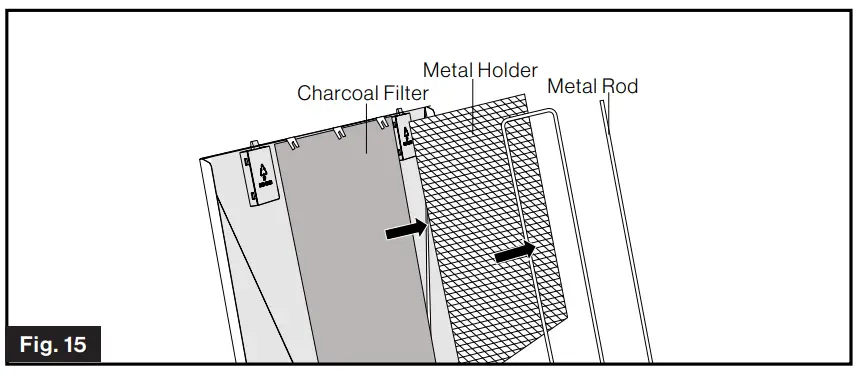
- Dip the metal holder into mild soapy water and wash by hand. (Do not use the dishwasher to wash.)
- Allow the metal holder to dry completely before replacing.
Charcoal FilterThis appliance is designed with a charcoal filter equipped to absorb smells and unwanted odors.The charcoal filter cannot be cleaned, we recommend they should be replaced approximately every three months or more often if the range hood is used for more than three hours per day. To replace the charcoal filter:
- Repeat steps 1 to 3 in section ‘Metal Holder’ to remove the metal rods and metal holder first.
- Remove the saturated charcoal filter and replace with a new one. (Fig. 16)

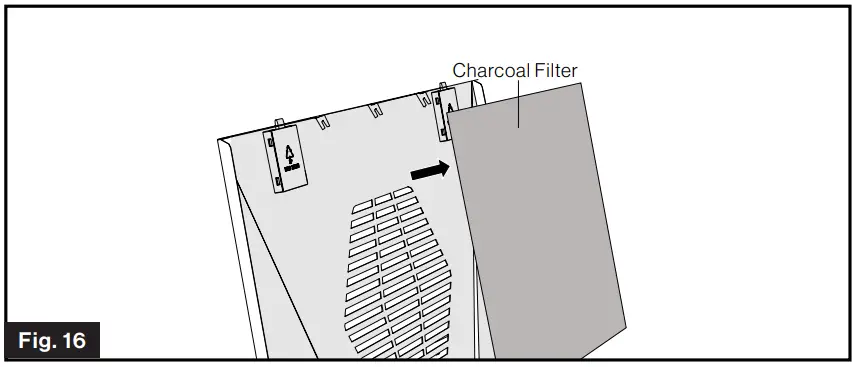
- The replacement charcoal filter can be obtained from your local service center.
- Repeat steps 4~1 in ‘Metal Holder’ to replace the filter panel. See figure 15 for the replacement process of the filter and metal holder.
Specifications
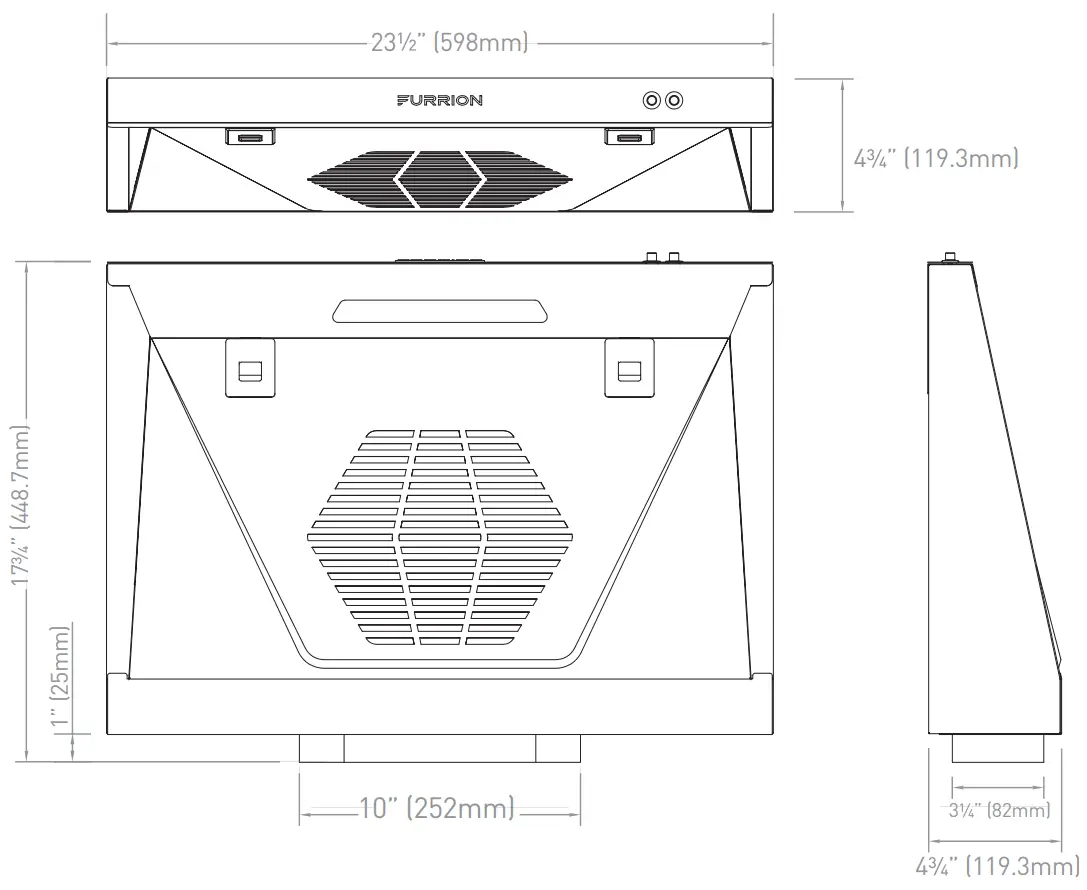

| Connection Voltage | 12V DC |
| Power Consumption | 1.1 A |
| Lighting Power Consumption | 0.95 W |
| Overall Dimension (W x H x D) | 231/2” x 1711/16” x 43/4” (598 x 449.3 x 119.3 mm) |
| Vent collar dimensions (W x H x D) | 10” x 1” x 31/4” (252 x 25 x 82 mm) |
![]()
![]()
References
[xyz-ips snippet=”download-snippet”]

